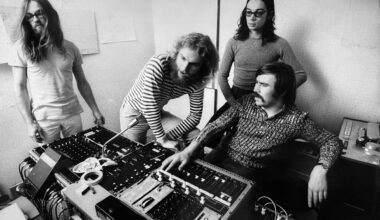From the abandoned mills of Greater Manchester to the glass and steel at the heart of London, John Foxx has always found peace – and music – in urban landscapes. Looking back on his prophetic role in electronic music, Foxx discusses his upcoming release of archive material, his latest projects and collaborations, and his love of the driving force behind much of his work – the city
John Foxx, gazing down benignly over the fast-mutating city, has a new retrospective compilation out, so I ask him if his past work startles him. Does he ever hear it and wonder how it was so prescient? Does he ever think, ‘How did I know that then? How did I see the future?’.
“It does happen,” he allows. “It is a surprise. But it wasn’t surprising to me at the time. The whole thing seemed quite normal and I couldn’t understand why other people didn’t get it. I thought, ‘Maybe I’m on the wrong track completely’. I thought that often. Maybe I was, but you just have to do what seems right at the time. And oddly enough, things turned out well.
“There’s a lot of instinct involved in music, isn’t there?” he continues. “You can’t really determine if it’s logical, or it’d get awfully dull. So you have to take chances. And you do that when you’re young, because you don’t give a toss, you’ve got nothing to lose.”
John Foxx is also releasing an ambient album about psychogeography and a collaboration with a violinist, so I ask him if he’s phased out lyrics and replaced them with textures.
“Well, I don’t want to repeat myself. Not too much, anyway. After a while you think, ‘I’ve said everything I want to say about that’. You tend to refine things, and you realise you can do more with less. There’s something about being young that’s all to do with showing off, and overdoing things. Except you’re not really overdoing things, you’re doing things just right for your age and time.
“But then you must avoid, as an artist, the terrible trap of imitating your former self. For me, that’s one of the cardinal sins. You must refine, and keep an eye to the future, and not look back too much. See where you can go with what you’ve built. And leave it to other people to adapt and adopt and change and steal and perfect whatever you’ve done in the past. If you’ve said, ‘I want to be a machine’ in the past, you don’t need to say it again. It’s implicit.”
Many are those who have adapted/adopted Foxx’s ideas since he broke away from the exclamation-mark incarnation of Ultravox and became a prime pioneer of electronica and synth music. His praises have been sung by everyone from The Human League and Ladytron to Vincent Gallo and Gazelle Twin. Foxx took the chilly likes of ‘No-One Driving’ onto ‘Top Of The Pops’ and his subtly influential ‘Metamatic’ album – released in January 1980 – pretty much announced the new decade with its rhythm machines and metal beats.
Foxx later founded The Garden studio in a converted warehouse in Shoreditch (long before the area was hip). By 1985, he was already restless again, withdrawing from music and becoming successful as a graphic artist (he’d studied at the Royal College of Art), designing high profile book covers from Rushdie to Shakespeare. Revitalised by the house/techno scene, he edged back into music, and since then a stream of increasingly experimental and self-contained records have emerged, not to mention art installations. He’s collaborated with Louis Gordon, Robin Guthrie, Harold Budd and, since 2009, with new ally Benge as John Foxx And The Maths.
This season sees the triple treasure trove of ‘20th Century: The Noise’, a retrospective of tracks from 1980 to 1999; ‘Codex’ under the name Ghost Harmonic, an experiment in what happens when a classical violinist (Diana Yukawa) is pitched against echoes, loops and analogue synths; and the “architectural” ambient album ‘London Overgrown’, which introduces us to a man, a woman, beautiful ghosts and a “city of mirage”. On top of all this, Foxx has been working in photography and film, and was made an honorary doctor of philosophy by Edge Hill University, Lancashire, last year. He’s nothing if not busy.
We’re sitting in a 15th floor restaurant, a panorama of London on the other side of the glass, which is known as “the wall of windows”. It seems appropriate. In a black duffle coat, John Foxx is both professorial and entirely easy-going, his northern accent guiding us through a range of subjects, none more intriguing than himself.
He was born Dennis Leigh in Chorley in 1948, his father “a coal miner and pugilist”. When speaking about ‘London Overgrown’, he reveals both the significant influence of his childhood and why he continues to be so active creatively. He’s telling me how empty and derelict parts of east London were when he moved there in the mid-80s (“It hadn’t really changed since The Ripper”) and of the skeletons that were found every time a new excavation took place. Of the underground rivers and tunnels London has learned to accommodate. This nudges him onto recalling his youth. He conjures up a scene that’s more Ballard than Ballard.
“Where I grew up, in Greater Manchester, it was all mill territory. The mills were closing down, becoming derelict, and as kids we used to play in these huge buildings as they were being emptied out. It was a strange feeling. There was something melancholic but also quite pleasant about nature taking over. You’d get trees growing inside the buildings. They’d have birds inside them, ivy hanging down the walls. It was like the Hanging Gardens of Chorley.
“And then I came to London and there were similar areas there. You could’ve mown the streets at one point. I used to wander about, seeing the plants going in and out of buildings. There was a tree growing out of the top of the studio we got.”
Before I can protest that this sounds rather too ‘Day Of The Triffids’ or ‘Planet Of The Apes’, Foxx acknowledges the amplifying power of imagination.
“At that time, there was a lot of interesting science fiction about abandoned cities, and it all worked together. It’s a recurring theme of mine, the future dystopia… well, not just mine, lots of people do it. I always enjoy films where somewhere like New York is abandoned, or half the world is overgrown. It was a theme long before movies, though: Keats and Shelley and Byron, the Romantic era of the 18th century. In the Shelley poem ‘Ozymandias’ – “Look on my works, ye Mighty, and despair!” – all that’s left are the broken feet of the statue in the sands. And so, it all goes, everything goes away…
“There are lots of follies in country houses in Britain, built as ruins, to look like ruins. To represent a contemplation on the folly of ambition. Not that ambition is a bad thing, but… it gives you a perspective. It’s sobering. It gives you a context and you realise that your time is limited. And you have to do the best you can. Build the finest ruins you can imagine.”
So this explains why you’re so prolific now? Getting as much done as possible?
“Yes. Before I leave the planet.”
If ‘London Overgrown’ is evocative of both the future and the past, ‘20th Century: The Noise’ confirms that Foxx’s past was everyone else’s future. It’s hardly his first “best of”, though. So as welcome as it is to have seminal minimalist masterworks like ‘Underpass’, ‘Burning Car’, ‘Europe After The Rain’ and the Foxx/Gordon version of the peerless ‘Hiroshima Mon Amour’ gathered together anytime any place, it begs the question, why another one now? The answer is of a practical strain.
“I got all my Virgin tapes back some time ago. Which is great. And unusual. I just got lucky when I signed the contract, inserting a clause that said everything reverts to me after a period. No, that’s not normal! We somehow got that through and, after leasing them to Demon for a time, it’s wonderful to have them back.
“We found some tracks and tapes in the vaults that hadn’t been released yet, which we’ve put on there, as well as revisiting the old records. There are always things I like to put right, with covers and credits and mixes, and I dusted down the details. You always think, ‘If I’d had more time then, I’d have done this or that’. Now I can make things as they were meant to be. They’re only minute differences, and possibly no one else but me would know, but it’s important to me at least.”

There’s a knowingness to that title. Yes, this music was 20th century, but it foresaw and predicted elements of the next century.
“It’s looking forwards and backwards simultaneously. There are sections I’m proud of because they were the first time something was done, and lots of people used those ideas after that. We would just use raw synth noise and then stop it without any ceremony whatsoever, no production values, just whacked in and whacked out. Or just white noise. And I loved it. When it came out, people were saying, ‘What’s that?’. Like it was some kind of interference or machine noise. Now of course, people use it all the time, quite happily. Lots of music uses that kind of thinking now.”
What is it about those sounds that did and still does make us think of futuristic images, of sci-fi and post-apocalyptic planetscapes?
“Well, the theremin was connected to science fiction early on, I guess. That fostered the connection. There was the ‘Clockwork Orange’ music and – oh – ‘Forbidden Planet’ was the main one. That was the first to use primitive synthesisers. Wonderful film… I remember seeing it in the Plaza in Chorley when I was seven or eight. I loved it – the sound then was totally new. It made a big impression, yes. And it was Technicolor, not black and white! Then on TV, you had things like ‘Quatermass’ and the Nigel Kneale stuff, and the Radiophonic Workshop beginning to happen…”
Formative influences?
“They were. Really were. And things like Joe Meek. And The Shadows! They had a very futuristic sound, early on, in the 1950s. I still think they were a big influence on Kraftwerk. Because they became the sound of European music, that techno guitar sound. I remember going to Europe when I was very young and hearing that echoey guitar on every jukebox.”
It’s strange to hear you talking about The Shadows as pioneers. Obviously we now just associate them with bland Cliff Richard numbers and suchlike.
“Of course. It’s a stretch. I understand that completely. But there was a moment, before they got diluted, when they had a very powerful identity. Then Link Wray and The Surfaris… this was all quite threatening, eerie music then. It represented rebel music. But then England sweetened rock ’n’ roll too much. Initially, English bands were too tame. They mixed it in with showbiz, just like where we are today. The general tenor and atmosphere of music is showbiz again. And that’s really dull.”
In your Ultravox years, is it fair to say that – thrilling and poetic though those albums are – the problem commercially was that the band were post-punk before punk had even finished saying its piece?
“We were pre-punk before punk had started, too! People weren’t ready. Being ahead of your time is worse than being behind your time if you want people to have some context for it. Things moved quickly then. We were listening to Roxy Music, Bowie, krautrock… we had a wider palette, but punk broke barriers, and they needed to be broken.”
There’s a wonderful quote from you around that time, where you explain why you’d changed your artist name from Dennis Leigh to John Foxx. “John Foxx is more intelligent than I am, better looking, better lit,” you said. “A kind of naively perfected entity. Like a recording… where you can make several performances until you get it right… or make a composite, then discard the rest.”
“I remember it, but I can’t remember exactly when I said it,” he muses. “I think there’s a point where you don’t know what you’re doing, you just do it because it feels right. And inventing someone else… you don’t question it, you just do it. I didn’t think about it much. Initially, I did it so I could separate my private life from it. I didn’t want to sign myself in at a hotel as that, in case I became recognisable. A fail-safe, to pre-empt anything like that. As it happened, I needn’t have worried… ha-ha!
“But it does have a value. You can blame things on someone else. You have a scapegoat. It becomes quite schizophrenic, but it’s dead useful as well. It still confuses me sometimes! But it’s a… construct. You gradually realise that bit’s too big, so you chip a bit off. You’re building something, and you can change it if you want, so it’s not like surgery. More like sculpture.”
Hence the other alter egos you’ve adopted for your work, like The Quiet Man?
“That was when I’d had enough of being onstage all the time, because we toured for five years in Ultravox. I’m not built for that. It wears you out, like a psychic drain. Your perceptions get a bit out of kilter. I’m not a good rock star, in that sense. The Quiet Man was a way of getting away from that public persona. All that stuff burned me out, so I moved towards tranquil. Plus I love being in the studio.”
You seem content with your identity and your situation now? And you’re teaching too?
“Yes, it’s all balanced, it feels right. It’s taken me long enough to get there. Things feel like they’re in accord at the moment. You change as you grow older and that’s part of the challenge too. You need to have some kind of dignity in your own eyes, so you won’t get me doing 80s revival tours or flogging a dead horse like that. I like to get on with new things. There’s a whole list of stuff that I still have to do.”
Which reminds me, we should discuss the Ghost Harmonic album, ‘Codex’.
“This record is just the beginning with that,” says Foxx. “A first step in that direction. I can imagine lots more ways to go with it.”
He describes how it had always struck him as odd that classical musicians couldn’t or wouldn’t improvise, having been trained not to.
“It was as if, amazingly, they lacked the confidence to solo or invent melodies.”
Neither were they fond of any effects or manipulation. So Foxx wanted to see what would happen if you used all the tricks of the studio – “double tracking, massive spaces, echoes, reverbs, loops” – with a classical violinist who dared to cross that line. Diana Yukawa’s violin was initially recorded over “very noisy” tape loops and “immediately it worked”.
Foxx speaks lovingly of the texture and sound of tape — “Everyone was trying to get rid of tape noise when it was universal, but I find something very satisfying about it” — and notes that “Once it’s gone, there’s a value on something that had none before”. Mulling over nostalgia, childhood, the digital revolution, the aspects of paper and print that we’ll miss — “These old paperbacks and magazines we throw in the bin will be sold at Christie’s in a hundred years” — he’s always thinking of connections lost and found between time, space, the internal and the external worlds, always probing the psychogeography that fuels and distinguishes his work. We discuss the changing states of Europe, London, Berlin, Brooklyn and other places imagined and real.
Back when you were among those who got the ball rolling, did you ever dream that electronica would flourish in the way that it does today?
“Yes, but it’s interesting that it’s become a genre of its own. I remember one day thinking, ‘Oh, it’s got a name and a branch, just like reggae or rock or any other sort of music’. And that felt like an achievement.
“But beyond that, it’s seeped into everything else as well. Whether it’s pop music or dance or film scores… they all have elements of electronic music. The way music’s made now is electronic. Over the years, I’d gradually realised that was inevitable. When the first few computers appeared, and the mechanic recording devices became portable, there was a moment when I thought, ‘Yes! This is the future!’.”
‘London Overgrown’ and ‘Codex’ are out on Metamatic






